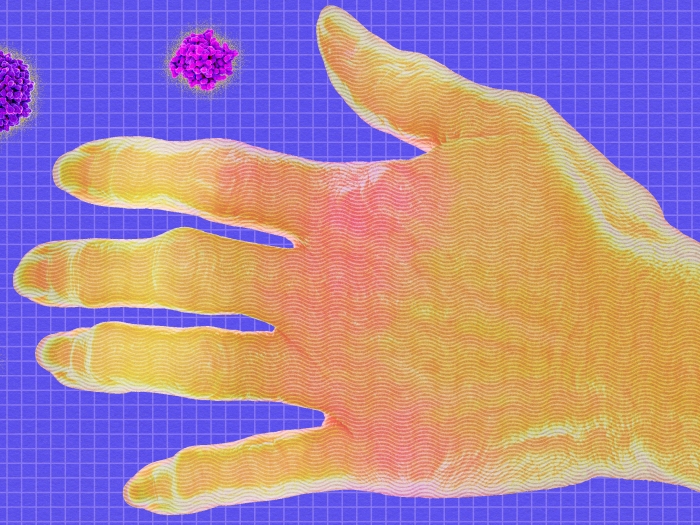Treatment planning for a painful and potentially disabling condition could be made easier with a new model for assessing genetic risk in people with psoriasis.
1:00 PM
Author |

With its unmistakable thick, scaly, white-and-red patches, psoriasis is a relatively common chronic skin condition that can lead to a greatly reduced quality of life.
LISTEN UP: Add the new Michigan Medicine News Break to your Alexa-enabled device, or subscribe to our daily audio updates on iTunes, Google Play and Stitcher.
And about 30 percent of people with psoriasis go on to develop psoriatic arthritis, a painful joint inflammation that can lead to long-lasting joint damage.
Now, a team of Michigan Medicine researchers is looking to genetics to help predict which patients with psoriasis will develop psoriatic arthritis — a connection that could be valuable in tailoring treatment.
Researchers have previously identified individual genetic mutations associated with a person's likelihood of developing Mendelian diseases (ones that are caused by a single inherited gene).
But many diseases — including psoriasis — are associated with a group of genes working in concert. These are known as complex diseases, because they result from the interplay of multiple genes and environmental and lifestyle factors. In the case of psoriasis, those factors include stress and infection.
That complex balance prompted Matthew Patrick, Ph.D., and Alex C. Tsoi, Ph.D., M.S., to use statistics and machine learning to develop a model to predict which psoriasis patients are at increased risk of developing psoriatic arthritis.
Their results are published in Nature Communications.
Genetic crystal ball
Patrick and Tsoi began their inquiry with large data sets of patients with and without psoriasis, including different cohorts of patients developed by principal investigator James Elder, M.D., Ph.D., the Kirk D. Wuepper professor of molecular genetic dermatology at U-M.
MORE FROM THE LAB: Subscribe to our weekly newsletter
"These data sets are really unique because they have 10 years' worth of follow-up to make sure we know which patients went on to develop arthritis and which did not," says Tsoi, a research assistant professor in dermatology, computational medicine and bioinformatics, and biostatistics.
Genetics represents an extremely valuable tool for disease screening, the researchers note.
"Unlike other screening approaches that depend on the timing of the development of symptoms, genetics do not change over time," says Patrick, a fellow in the department of dermatology.
Patrick, Tsoi and their colleagues evaluated genetic markers in people with psoriasis, psoriatic arthritis and people without either condition.
This information was fed into computer programs that then attempt to define which set of markers has the power to differentiate between patients with just psoriasis and those with psoriatic arthritis.
"We identified a few hundred to 1,000 genetic variants that provide a fair prediction for psoriatic arthritis," Tsoi says.
What's next
While the model works especially well in patients carrying the most extreme genetic burden for many of these selected markers and who are at highest risk of developing psoriatic arthritis, Tsoi and Patrick note that more information is needed to help predict the condition in medium-risk patients.
"There are still a lot of things we have to consider in defining risk," Tsoi says. "Perhaps we could integrate the genetic screen with a blood test to look for additional biomarkers that differentiate patients who will develop psoriatic arthritis before symptoms appear."
SEE ALSO: Researchers Find Key Genetic Driver for Rare Type of Triple-Negative Breast Cancer
The team is working to find more cohorts of patients to prove the robustness of the model before it can become a clinical tool, Patrick adds.
Still, the researchers note that this type of test raises ethical questions — should patients be informed of an increased risk of a disease for which there is no cure, for example — and the need for health care providers and access to services to ensure that patients who want this information about their futures can act on it.
This work was supported by the Arthritis National Research Foundation and the National Psoriasis Foundation. Tsoi is supported by National Institutes of Health K01AR072129, and Elder is supported by the NIH R01AR042742, R01AR050511, R01AR054966, R01AR063611 and R01AR065183 awards.

Explore a variety of healthcare news & stories by visiting the Health Lab home page for more articles.

Department of Communication at Michigan Medicine
Want top health & research news weekly? Sign up for Health Lab’s newsletters today!





